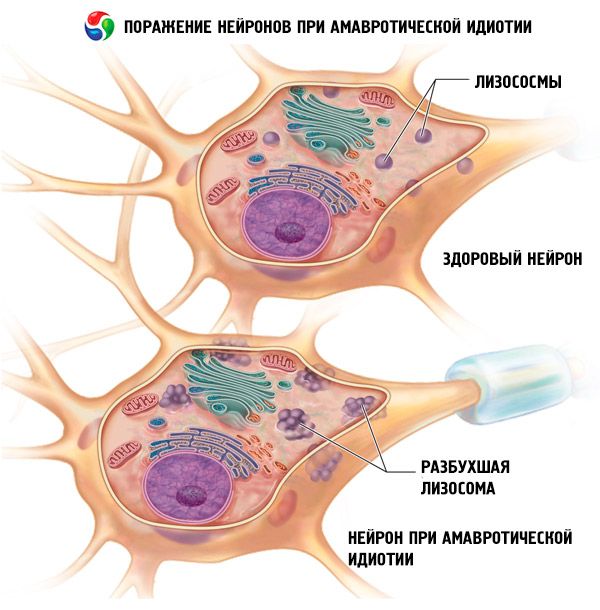Medical expert of the article
New publications
Amaurotic idiocy
Last reviewed: 04.07.2025

All iLive content is medically reviewed or fact checked to ensure as much factual accuracy as possible.
We have strict sourcing guidelines and only link to reputable media sites, academic research institutions and, whenever possible, medically peer reviewed studies. Note that the numbers in parentheses ([1], [2], etc.) are clickable links to these studies.
If you feel that any of our content is inaccurate, out-of-date, or otherwise questionable, please select it and press Ctrl + Enter.

Amaurotic idiocy is a rare progressive disease. It is characterized by a gradual decrease in vision to complete blindness and degradation of intelligence until idiocy sets in. As a result, the patient develops profound marasmus with a fatal outcome. The disease was first described by ophthalmologist Dr. Tau more than 130 years ago. Tau noted a special transformation of the fundus. More than 500 cases of the disease have already been described.
 [ 1 ], [ 2 ], [ 3 ], [ 4 ], [ 5 ], [ 6 ], [ 7 ], [ 8 ], [ 9 ], [ 10 ]
[ 1 ], [ 2 ], [ 3 ], [ 4 ], [ 5 ], [ 6 ], [ 7 ], [ 8 ], [ 9 ], [ 10 ]
Epidemiology
The epidemiology of the disease notes a familial nature. In families where there are patients with amaurotic idiocy, consanguineous marriages are dangerous for the same reason. Also at risk are people of Canadian-French or Jewish origin.
 [ 11 ], [ 12 ], [ 13 ], [ 14 ], [ 15 ], [ 16 ], [ 17 ], [ 18 ]
[ 11 ], [ 12 ], [ 13 ], [ 14 ], [ 15 ], [ 16 ], [ 17 ], [ 18 ]
Causes amaurotic idiocy
Despite the numerous data collected about the disease, scientists currently continue to search for answers to many questions about the causes, pathogenesis and even manifestations of amaurotic idiocy.
There are suggestions that the disease is hereditary. The type of inheritance is autosomal recessive. Most often, the cerebellum and occipital lobes of the cerebral hemispheres are affected, with severe consequences and complications for the entire body: atrophy of the optic nerves, nerve fibers can lose their membranes, and connections between nerve cells can disintegrate.
Most experts acknowledge that the clinical signs of the disease can be quite varied and correlate with the age at which amaurotic idiocy began to develop in the patient.
During the study of the causes of the disease, a certain pattern was noticed: the disease often affects children from the same family, which is why the name "familial amaurotic idiocy" is used. According to the studies, the results of which were published when they were just beginning to study the disease, out of 64 cases of amaurotic idiocy, 37 were found in 13 families (each family had 2-5 sick children). It is noteworthy that in such families, the sick had absolutely healthy brothers and sisters. Nowadays, it is believed that the factor of recessive inheritance plays a great role in the development of the disease. Thus, it is possible to explain the frequency of occurrence of cases of the disease in the same families. When analyzing the heredity factor as a cause of amaurotic idiocy, one must not limit oneself to the presence of clinically expressed signs in families of patients (both in the ascending and lateral lines), but also take into account rudimentary ones, for example, characteristic deviations in the functioning of the visual apparatus (familial choroiditis, pigmentary retinal dystrophy, etc.).
Symptoms amaurotic idiocy
Stages
The infantile form develops from 4-6 months. This form of amaurotic idiopathies is characterized by a familial nature. Vision rapidly declines: the baby cannot fix his gaze, does not observe objects. The so-called "cherry pit" appears on the fundus - a reddish spot in the macular region, which is surrounded by a gray-white rim. Then the optic nerves atrophy, and the child completely loses the ability to see. Orientation, protective reflexes, as well as the ability to move, are gradually lost. Patients react strongly to sound stimuli - they flinch from a sound that is quiet for a healthy person, convulsions may be observed due to increased muscle tone. In the final stage of the disease, general atrophy, exhaustion of the body and increased tone of all extensor muscles develop. The prognosis of the disease is also disappointing: the patient dies one and a half to two years after the onset of the disease.
The late childhood form begins at 3-4 years. The progressive disease alternates with stages of remission. The gradual loss of intelligence is accompanied by seizures, coordination disorder, and extrapyramidal disorders. This form is also characterized by optic nerve atrophy. Death occurs 6-8 years after the onset of amaurotic idiocy.
The juvenile form begins to manifest itself at 6-10 years. Spielmeyer's amaurotic idiocy progresses less quickly. Changes in the fundus coincide with manifestations of pigmentary retinal dystrophy. The patient's vision gradually declines, as does intelligence. Impaired motor functions can manifest themselves in different ways and inconstantly: not very pronounced paralysis of the arms and legs, extrapyramidal and bulbar disorders occur. The disease leads to death 10-25 years after the development of the first signs.
The late form occurs very rarely and develops extremely slowly. The patient's mental state changes (like an organic mental syndrome), atrophy of the optic nerves and pigmentary dystrophy of the retina are observed. The final stage is characterized by paralysis and epileptiform syndrome. The patient dies 10-15 years after the onset of the disease.
 [ 38 ], [ 39 ], [ 40 ], [ 41 ], [ 42 ], [ 43 ], [ 44 ], [ 45 ]
[ 38 ], [ 39 ], [ 40 ], [ 41 ], [ 42 ], [ 43 ], [ 44 ], [ 45 ]
Forms
There are four types of amaurotic idiocy:
- Tay-Sachs (affecting at an early age);
- Jansky-Bilynovsky (appearing in children at a later age);
- Spielmeyer-Vogt syndrome (occurring in adolescents);
- Kufsa (late form).
Some scientists also distinguish the congenital Norman-Wood type separately.
Each type of disease has its own set of clinical manifestations, but they are all united by common causes, clinical picture, anatomical base and pathogenesis.
 [ 46 ], [ 47 ], [ 48 ], [ 49 ], [ 50 ], [ 51 ], [ 52 ], [ 53 ], [ 54 ]
[ 46 ], [ 47 ], [ 48 ], [ 49 ], [ 50 ], [ 51 ], [ 52 ], [ 53 ], [ 54 ]
Diagnostics amaurotic idiocy
Amaurotic idiocy is caused by a disorder of lipid metabolism, as a result of which an intermediate product of lipid metabolism, sphingomyelin, is deposited in various cells of the body. The location and composition of the deposits determine the development of a specific clinical picture of the disease.
 [ 55 ], [ 56 ], [ 57 ], [ 58 ], [ 59 ], [ 60 ], [ 61 ], [ 62 ], [ 63 ]
[ 55 ], [ 56 ], [ 57 ], [ 58 ], [ 59 ], [ 60 ], [ 61 ], [ 62 ], [ 63 ]
How to examine?
Differential diagnosis
Differential diagnosis of amaurotic idiocy is based on a specific clinical picture and characteristic pathologies of the fundus.
The early form has symptoms similar to Landing's disease, a type of mucopolysaccharidosis. Landing's disease develops from the first months after birth and leads to death after 2-3 years. A "cherry pit" on the fundus appears in 1/5 of cases, degenerative changes in the retina and distorted perception of sounds (hypercussion) are practically not characteristic of it, but simultaneous enlargement of the spleen and liver, mental disorders and movement disorders are noted.
The juvenile form sometimes overlaps with the manifestations of Lawrence-Moon-Biedl syndrome. To differentiate these diseases, it is necessary to pay attention to their other manifestations. Lawrence-Moon-Biedl syndrome is characterized by rapid weight gain, limb deformation characterized by the presence of additional fingers or toes, noticeable vegetative-trophic disorders and the absence of motor function disorders.
The variety of symptoms of late amaurotic idiocy complicates diagnosis during life. Its manifestations are similar to Friedreich's ataxia, multiple sclerosis, Alzheimer's disease, Pick's disease, progressive paralysis, and even schizophrenia.
Some authors insist that the diagnosis of this disease, especially when the clinical manifestations are blurred, can be reliably established only after death, based on the analysis of histological abnormalities of the nervous system.
Who to contact?
Treatment amaurotic idiocy
There is no rational and effective treatment. Nowadays, therapy for amaurotic idiocy is aimed exclusively at relieving symptoms. Sedatives, nootropics, anticonvulsants and general tonics are used.
To activate blood circulation and metabolic processes in the brain, glycine, elkar, cerebrolysin, glutamic acid, and pantogam are prescribed.
To relieve convulsive syndrome, diphenin or carmazepine are prescribed.
A positive result can be achieved by using tissue extracts, blood transfusion or plasma.
Prevention
The lack of effective therapy for amaurotic idiocy forces us to pay close attention to prevention. There are already methods that allow us to identify heterozygous carriers of the pathological gene and methods for diagnosing amaurotic idiocy during pregnancy. Antenatal diagnostics of the disease consists of analyzing the activity of hexosaminidase A in the amniotic fluid. If reduced enzyme activity is detected, it is recommended to terminate the pregnancy. Parents of a sick child are advised to stop having children.
Использованная литература


